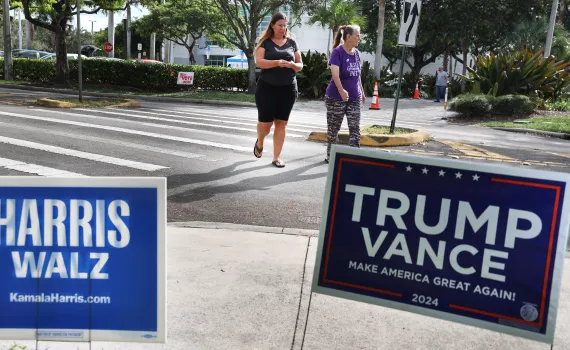Republican Gains in Last Week’s Election Signal Setbacks for U.S. Cannabis Legalization
LOS ANGELES – Last Wednesday’s election marked a pivotal moment in U.S. cannabis policy, as Republican gains across several states stoked a fresh wave of resistance against adult-use cannabis legalization. This shift, especially pronounced in states with existing medical cannabis programs but where adult-use remains controversial, has the potential to impact state revenues, the growth of the cannabis industry, and the broader trajectory of legalization.
Florida’s Setback: The Fall of Amendment 3
In Florida, a significant blow was dealt to the legalization movement when Governor Ron DeSantis confirmed that Amendment 3, which sought to legalize adult-use cannabis, had failed to secure the 60% approval required for constitutional amendments. Despite securing 55.7% of the vote, the initiative fell short, underscoring a hard-fought battle marked by over $140 million in industry funding. The loss represents a major setback for companies like Trulieve Cannabis Corp., which had banked on Florida becoming a key adult-use market.
Smart & Safe Florida, the advocacy group behind the initiative, remains undeterred, announcing plans to collaborate with state leaders on more conservative reforms, such as decriminalization and home cultivation, while continuing to push for gradual cannabis reform in the state.
Restrictive Trends in Other States
While Florida’s defeat was particularly significant, it was not an isolated incident. The trend of restricting cannabis reform efforts was seen in other states as well:
– Ohio: Although voters approved adult-use cannabis legalization in November, Republican leaders are now pushing to limit the program through zoning restrictions and a delayed implementation process.
– South Dakota: In a notable defeat for legalization advocates, Measure 21 failed, as Governor Kristi Noem and her allies successfully defeated the adult-use bill. The state plans to tighten regulations on dispensaries, signaling a continued resistance to full cannabis legalization.
– North Dakota: Similarly, Measure 5 also failed at the polls, reflecting the broader conservative push against adult-use cannabis in many regions.
In a rare victory for legalization advocates, Nebraska saw success as voters approved two key measures: one legalizing medical marijuana and another establishing a regulatory framework for the industry. With nearly 71% voting in favor of legalization and almost 67% supporting a commission to oversee the industry, the victory was significant. However, local reports suggest potential legal challenges, as a judge in Lancaster County still must rule on whether some 230,000 signatures used to get the measures on the ballot were valid. If roughly 3,500 signatures are disqualified, the results could be voided.
National Implications and Conservative Shifts
The resistance in Florida and other conservative states underscores the difficulty of establishing a cohesive national cannabis policy. In many areas, the rollback of adult-use legalization is occurring alongside new restrictions on drug policy reform, particularly regarding the social impact of drug use. This shift was also visible in California, where voters approved Proposition 36, reinforcing stricter penalties for certain drug offenses—a stark departure from the state’s earlier progressive stance.
Opponents in Florida leaned into fears of crime and addiction, echoing concerns raised by conservative leaders across the country about the potential social consequences of recreational cannabis use. Regina LaBelle, from Georgetown University’s Addiction and Public Policy Initiative, attributes this trend to rising public anxiety over the disruptions caused by drug use, a sentiment that has gained traction in many communities.
Psychedelics: Facing Similar Barriers
The resistance to cannabis is not isolated to marijuana alone. Psychedelics, particularly psilocybin, are also encountering substantial pushback. In Massachusetts, voters rejected a proposal to legalize psilocybin, highlighting public discomfort with the proposed creation of therapeutic centers and the allowance for cultivation. Experts like Mason Marks from Harvard University suggest that public hesitancy around psychedelics is tied to a lack of comprehensive regulation and the need for further clinical studies before such substances can be widely legalized.
The Road Ahead
As analysts predict a shift in drug policy from corporate-driven models to those centered on public health, the cannabis industry finds itself at a critical crossroads. Advocates are now calling for targeted measures that better align with public concerns, including THC limits and tighter restrictions on marijuana products. These measures aim to create a balanced approach that prioritizes public health while also continuing the push for cannabis reform in an increasingly complex political landscape.



































